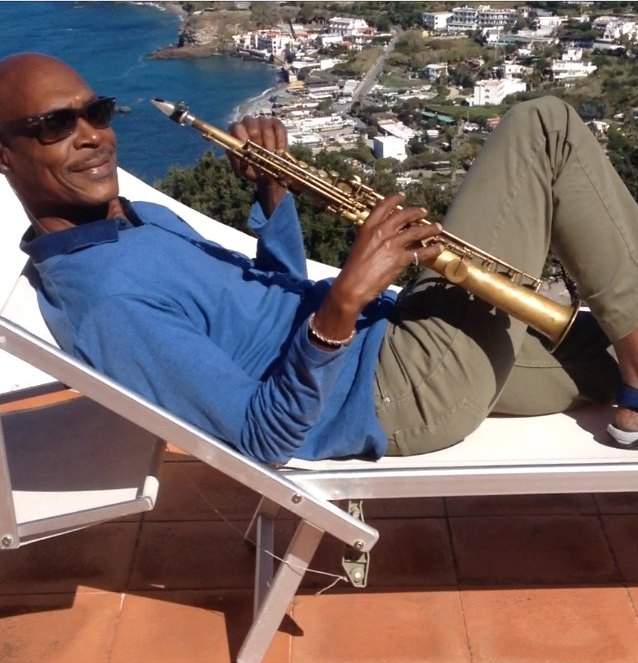Born in Port-au-Prince in January 1959. At the age of 14, he left Haiti to study in Paris. It is there that he discovers jazz and that a true passion is born. He is fascinated by free jazz musicians, the incredible power of their music, the freedom that permeates their improvisations and the determination of their political discourse. He hears them as well in Paris as in New York, where he spends his holidays: “I went to high school in Paris and I spent the summer in New York, jazz followed me to my bed: in New York , summer 78, I lived at 165 Bleeker Street, in the village opposite the Village Gate. Then in 1981, at 35 rue Dunois, in the 13eme arrondissement in Paris opposite the jazz club Le Dunois. I could listen to the greatest jazzmen passing through Paris.”
At university, he met Francis Bebey, saxophonist who advised him to get started with the saxophone. At 23 he bought his first saxophone, and embarked on a self-taught apprenticeship, influenced by Braxton Taylor, Coltrane, Ahepp… Two years later, he played with the Belghoul brothers before being replaced by Charles Taylor (ex-sax by Cecil Taylor) when he decides to return to live in Port-au-Prince.
At that time, Haiti experienced a double effervescence, political and cultural. The political changes preceding the fall of Jean-Claude Duvalier are accompanied by a new musical movement, called “Rasinn”, which advocates the revaluation of peasant culture and vodou. The musical groups stage the vodou rhythms by associating them sometimes with modern consonances: rock, reggae or even jazz. Thrugot thus comes to give a new scale to an already existing group “Foula”.
With the raw energy of traditional drums, supported by the bass and enhanced by the guitar, the Thurgot saxophone brings the true dimension of jazz and the passion of improvisation. Without being the first Haitian group to merge jazz and vodou, “Foula” will long mark the spirits because it embodies perfectly, on the scene, the wind of novelty and the breath of freedom that marked Haiti at that time. Subsequently, with the emigration of several of musicians, the group is defeated. His last appearance before the Haitian public took place in 1992.
From 1986 to 2002, Thurgot composed film music for documentaries: “Tiga” by Arnold Anthonin and “Des Hommes et des Dieux” by Laurence Magloire and Anne Lescot. He hosts national television and radio broadcasts. He teaches music at ENARTS and at the Lycee Francais in Port-au-Prince. He plays with some Haitian jazz musicians such as: Joel and Mushi Widmaier, Claude Care, Effy Prophete, etc.
In 2002, he created his own band, “Thurgot Theodat Band”, comprising in addition to the saxophone: Loubens Bien-Aime on drums, Marck- Richard Mirand on bass, Evens Saint Juste on guitar, Claude Saturne and Jean- Marie Luoissaint “Kebyesou” on percussion.
In 2003, he decided to settle in the south of France while maintaining contact with Haiti where he toured in 2002 on the initiative of the French Institute.
Back in Haiti, he recorded his first album with his name “Badji”, with the participation of French musicians: guitarist Claude Py and drummer Sega Seck. This disc reflects more than twenty years of jazz and Vodou rhythms. It is directly inspired by the previous work of composer Gerald Merceron who had attempted, in the 1970s, an avant-garde marriage between jazz and traditional Haitian rhythms. Thurgot continues on this experimental path and marries the spirits of jazz and vodou in the secret of “bajdi” (piece of Vodou peristyles reserved for sacred objects). He produces a real vodou-jazz album where vodou drums are very present and the rhythms congo, petro, or nago are associated with a strong jazz in improvisation, swing, be bop or free jazz, sometimes taking funk or roc.
“Badji” signs the obstinacy of a musician to create, against all odds away from fashions and commercial circuits, an uncompromising work bringing together music – Jazz and vaudou – which, despite appearances, are intimately related by their history and their signification.
From 2007 to 2012, Thurgot Theodat directed the National School of Arts of Haiti while pursuing his career as a musician and the “Badji” project in Haiti (Jazz Festival of Port-au-Prince), Jacmel Music Festival ) and abroad (Festival de Jazz de Pointe à Pitres, Kreyol Factory à la Villette, En Clave Afrocaribe project from the network of Spanish Cultural Centers) filmed and recorded on CD in 2011. He was fired from ENARTS in 2012 by President Martelly for ideological divergence. He released the 2nd CD “Badji 2” recorded in France in 2017; publication in 2019 of “Badji 3” recorded in Havana, Cuba; “Badji 4” is being recorded in Guatemala which will be released in May 2020. Thurgot Theodat is currently in the studio with the great American saxophonist David Murray for the recording of 2 CDs

